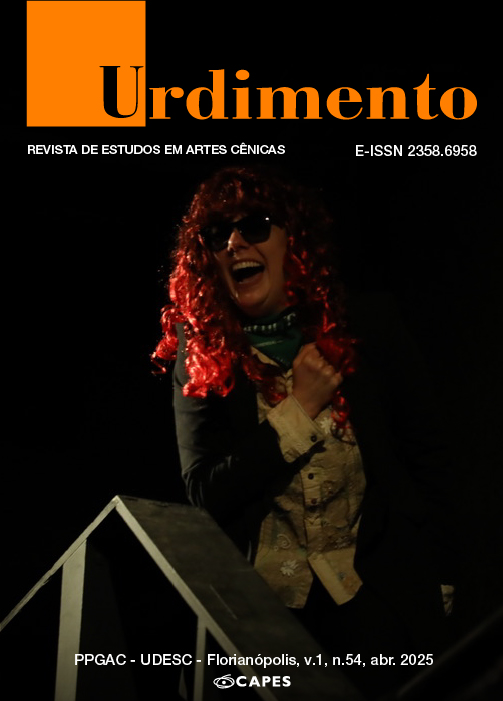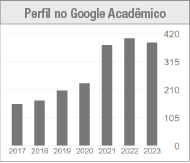Um modelo antifascista para ser encontrado: uma experiência da Escola de Teatro Popular
DOI:
https://doi.org/10.5965/1414573101542025e107Palavras-chave:
fascismo, Brecht, modelos, escola de teatro popularResumo
O artigo é um esforço de debater uma experiência de criação de um modelo teatral brechtiano sobre o tema do fascismo pela Escola de Teatro Popular (ETP). Para isso, (1) apresentamos o que é a ETP, e, em seguida, (2) o que a ETP entende como um modelo para Brecht. Depois, (3) discute-se o tema do fascismo e (4) como a biografia e as obras de Brecht se articularam com esse tema, em especial considerando o período do nazismo alemão. Assim, temos finalmente condições de apresentar o modelo sobre fascismo que está em desenvolvimento pela ETP. O tema é altamente pertinente considerando o período de ascensão da extrema-direita fascista que demandou da ETP maneiras de pensar a forma do fascismo em cena.
Downloads
Referências
AMARAL, M. Bolsonaristas articulam na Europa criação de coalizão da extrema direita internacional. Agência Pública, 11 jul. 2024. Disponível em: https://apublica.org/2024/07/bolsonaristas-articulam-na-europa-criacao-de-coalizao-da-extrema-direita-internacional/. Acesso em: 15 fev. 2025
BOAL, J. Sobre antigas formas em novos tempos: o Teatro do Oprimido hoje: entre “ensaio da revolução” e técnica interativa de domesticação das vítimas. São Paulo: Hucitec Editora, 2022.
BRECHT, B. Der Arbeiter. Nova Iorque, 23 nov. 1935.
BRECHT, B. The Private Life of the Master Race: a documentary play. Trad. Eric Russell Bentley, com assistência de Elisabeth Hauptmann. New York: New Directions, 1944.
BRECHT, B. Teatro dialético: ensaios. Seleção e introdução de Luiz Carlos Maciel. Rio de Janeiro: Civilização Brasileira, 1967.
BRECHT, B. Estudos sobre teatro. Rio de Janeiro: Nova Fronteira, 1978.
BRECHT, B. Diário de trabalho. v. 1: 1938-1941. Rio de Janeiro: Rocco, 2002.
BRECHT, B. On Arts and Politics. Edição de Tom Kuhn e Steve Giles. New York; London: Bloomsbury, 2003.
BRECHT, B. Teatro Completo – Bertolt Brecht. Vol. 4. São Paulo: Paz e Terra, 2014.
BRITTO, G. Augusto Boal e a Formação do Teatro do Oprimido. Mórula e Expressão Popular: São Paulo, 2024.
CARVALHO, S. de. Brecht e a polêmica sobre o expressionismo. Marx e o Marxismo, v. 3, n. 5, p. 313-324, jul./dez. 2015. Disponível em: https://www.niepmarx.com.br/index.php/MM/article/view/144. Acesso em: 8 fev. 2025.
DIMITROV, G. Der Dramatiker Bertolt Brecht. Austro-American Tribune, 1 jul. 1945. Disponível em:https://www.marxists.org/portugues/dimitrov/1935/fascismo/02.htm. Acesso em: 15 fev. 2025.
MACHADO, C. E. J. (Org.). Um capítulo da história da modernidade estética: debate sobre o expressionismo. São Paulo: Editora Unifesp, 2011.
NOLASCO, Amanda; BRITTO, Geo; BOAL, Julian. O teatro como forma de fazer política: a Escola de Teatro Popular de Rio de Janeiro. Conjunto, Casa de las Américas, Havana, Cuba, n. 206-207, jan.-jun. 2023. p. 46-57.
PARKER, S. Bertolt Brecht: a literary life. London: Bloomsbury Methuen Drama, 2014.
PEIXOTO, F. O melhor teatro do CPC da UNE. São Paulo: Global, 1989.
POSADA, F. Lukács. Brecht e a situação atual do realismo socialista. Rio de Janeiro: Civilização Brasileira, 1970.
STAFF, ETP "Citizenship on Stage: A Project of the Popular Theatre School in Rio de Janeiro", Pedagogy and Theatre of the Oppressed Journal, v. 5, Article 7. 2020. Disponível em: https://scholarworks.uni.edu/ptoj/vol5/iss1/7 Acesso em: 15 fev. 2025.
UNITED STATES HOLOCAUST MEMORIAL MUSEUM. Gleichschaltung: A Coordenação do Estado Nazista. Enciclopédia do Holocausto. Acesso em: 15 fev. 2025.
WHITE, John J.; WHITE, Ann. Bertolt Brecht’s Furcht und Elend des Dritten Reiches: a German exile drama in the struggle against fascism. New York: Camden House, 2010.
Publicado
Como Citar
Edição
Seção
Licença
Copyright (c) 2025 Urdimento - Revista de Estudos em Artes Cênicas

Este trabalho está licenciado sob uma licença Creative Commons Attribution 4.0 International License.
Declaração de Direito Autoral
Os leitores são livres para transferir, imprimir e utilizar os artigos publicados na Revista, desde que haja sempre menção explícita ao(s) autor (es) e à Urdimentoe que não haja qualquer alteração no trabalho original. Qualquer outro uso dos textos precisa ser aprovado pelo(s) autor (es) e pela Revista. Ao submeter um artigo à Urdimento e tê-lo aprovado os autores concordam em ceder, sem remuneração, os seguintes direitos à Revista: os direitos de primeira publicação e a permissão para que a Revista redistribua esse artigo e seus meta dados aos serviços de indexação e referência que seus editores julguem apropriados.
Este periódico utiliza uma Licença de Atribuição Creative Commons– (CC BY 4.0)




